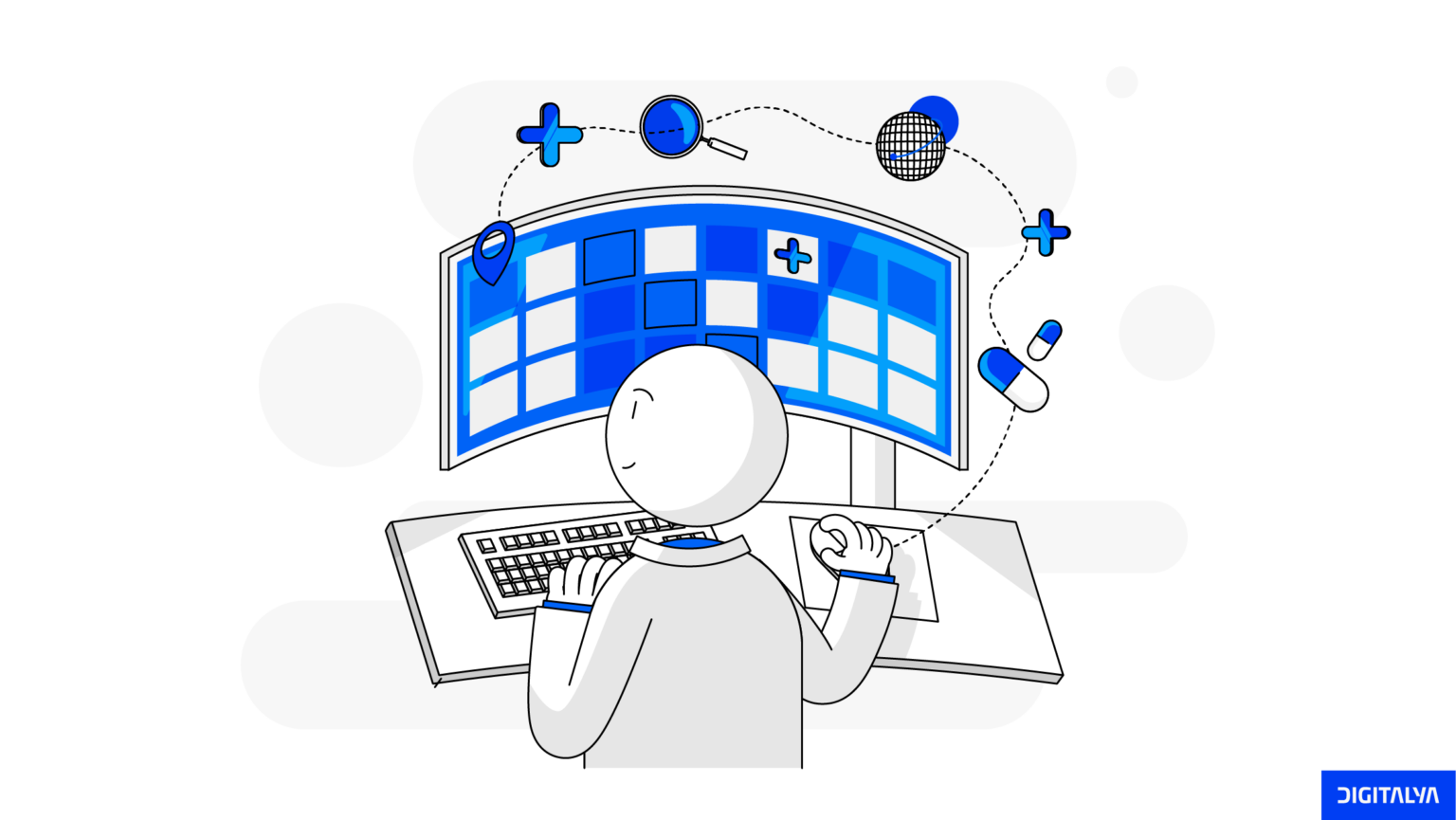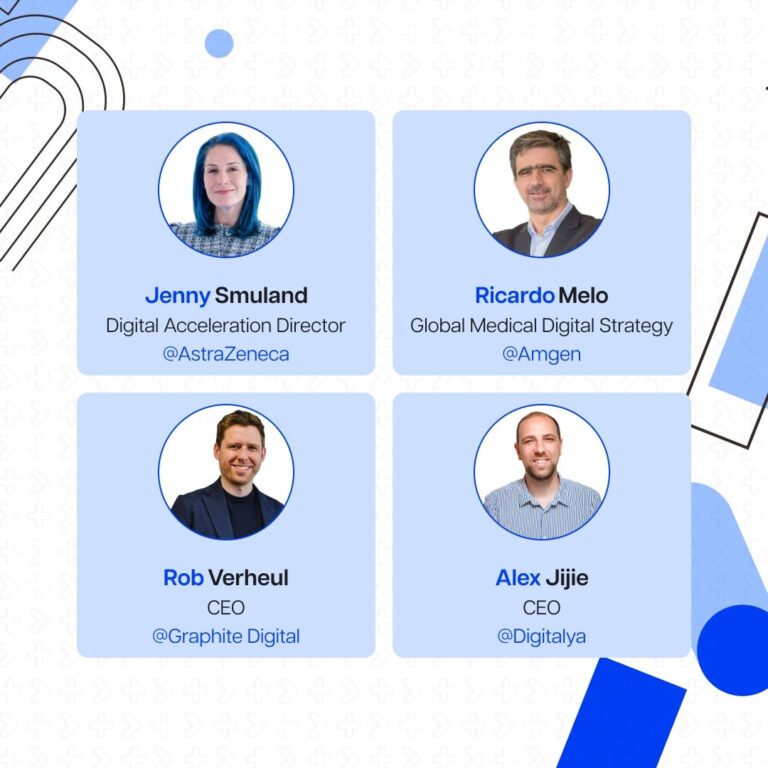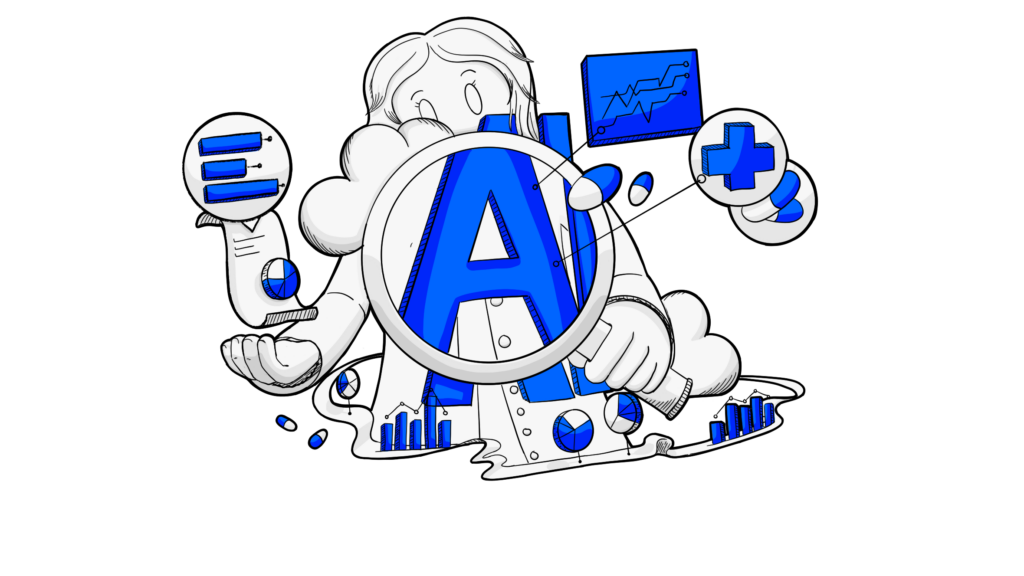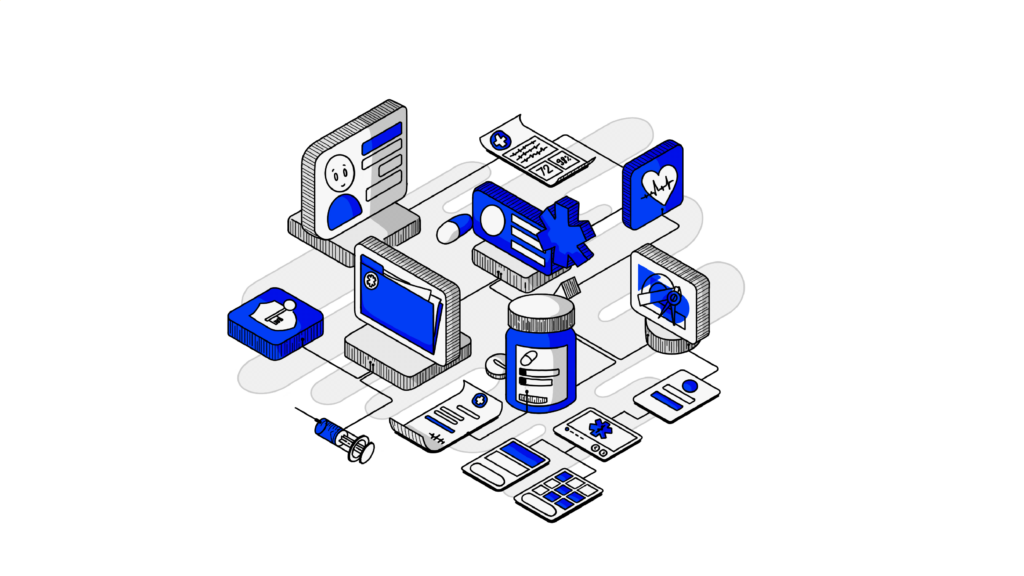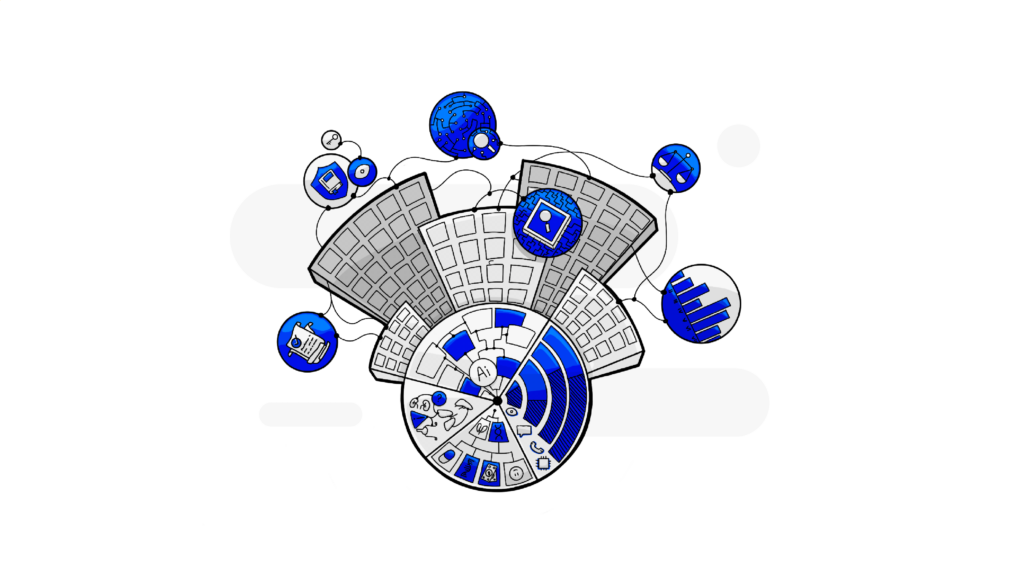1. Why Use Pharma AI Chatbots for Internal Knowledge Management?
Pharma chatbots are becoming a cornerstone of effective internal knowledge management in the pharmaceutical industry. Here’s why they stand out:
- Instant access to information
Employees can access information anytime, anywhere, eliminating the need to wait for specific working hours or rely on human support. AI chatbots can process queries and provide answers in real-time, significantly reducing response times.
AI-powered search capabilities help users find the exact information they need, saving valuable time. - Enhanced knowledge sharing
AI tools can serve as a central knowledge repository, making information easily accessible. They can facilitate collaboration by breaking down silos and promoting cross-functional interactions.
By interacting with employees, advanced chatbots can identify knowledge gaps and facilitate information sharing among teams. - Accelerated decision making
Artificial intelligence can analyze vast amounts of data to provide actionable insights, enabling data-driven decisions. By quickly accessing relevant information, employees can efficiently troubleshoot problems and identify solutions.
Additionally, by identifying potential risks and suggesting mitigation strategies, chatbots can help minimize costly errors and ensure compliance.AI chatbots can automate routine tasks, freeing up employees to focus on more strategic and creative work.
- Reduced training costs
AI chatbots offer on-demand training and support, reducing the need for formal training sessions and associated costs. They can tailor training materials to individual needs and learning styles, enhancing knowledge retention.
- Increased employee productivity
Artificial intelligence boosts efficiency and job satisfaction by automating routine tasks and streamlining workflows. It also reduces administrative burdens, allowing employees to focus on higher-value activities.
- Data-driven insights
AI tools analyze data to identify trends, patterns, and potential insights. By leveraging historical data and machine learning, AI models can predict future trends and anticipate potential future issues.
- Improved knowledge sharing and collaboration
AI tools can act as platforms for instant communication and information exchange, facilitating the dissemination of critical information such as clinical trial results, medication updates, and patient data.
This helps healthcare providers make more informed decisions, leading to better patient outcomes. It also helps pharmaceutical companies collaborate more effectively with researchers, clinicians, and patients, accelerating the drug discovery process and improving the development of new treatments. - Enhanced employee experience and productivity
By automating routine tasks, such as data entry and customer support, AI chatbots can free up employees to focus on more complex and high-value tasks, such as research and development, clinical trials, and patient engagement.
- Reduced costs and increased efficiency
AI chatbots can minimize the risk of errors, improve data quality, and reduce the time and resources required for data analysis by reducing the need for human intervention.
This enables pharma companies to allocate resources more effectively, reduce costs, and improve overall efficiency.
2. Use cases for pharma AI chatbots
These AI chatbots can transform how pharmaceutical companies manage internal workflows by streamlining access to critical information and enhancing collaboration across teams. From sales and marketing to regulatory compliance, chatbots can offer tailored solutions to meet each department’s unique needs.
2.1 Sales data retrieval
Let’s imagine the following scenario:
A sales representative needs to prepare for a meeting with a key customer in the pharma industry. They ask the chatbot: “What were the sales figures for our oncology drugs in this region over the past two years, and what are the top-selling competitors?”
The chatbot quickly retrieves the data, generates a concise report with visualizations, and highlights key trends and insights, enabling the representative to prepare effectively for the meeting.
So, what would the challenges be for this use case?
- Slow data retrieval — traditional methods like manual data entry or complex SQL queries can be time-consuming.
- Data silos — sales data may be scattered across multiple systems, making it difficult to get a complete picture.
- Data accuracy — inconsistent data entry or outdated information can lead to inaccurate analysis.
How can AI chatbots help?
- Natural language queries — sales reps can simply ask questions like “What were the sales figures for product X in Q1?”
- Automated data retrieval — the chatbot can access and integrate data from various sources, providing a unified view.
- Data visualization — the chatbot can present data in an easily understandable format, such as charts and graphs.
- Personalized insights — the chatbot can analyze sales patterns and provide personalized recommendations, such as identifying potential upselling opportunities or suggesting targeted marketing campaigns.
2.2 Product information sharing
Pharmaceutical companies need to disseminate accurate and up-to-date product information to various internal and external stakeholders, including sales teams, medical affairs, regulatory departments, and healthcare providers.
How can AI chatbots help in this scenario?
- Centralized knowledge base — an AI chatbot can act as a central repository for all product information, including product descriptions, features, benefits, clinical trial information, safety data, regulatory approvals, and marketing materials.
- Personalized information delivery — the chatbot can deliver the most relevant product information to each user based on their role and needs.
- Automated information updates — the chatbot can automatically update product information as new data becomes available, ensuring that all stakeholders have access to the latest information.
- Compliance support — the chatbot can help ensure compliance with relevant regulations by providing access to up-to-date regulatory information and flagging any potential compliance issues.
2.3 Clinical trials information
Let’s go through the following example:
A researcher is investigating a new treatment for a rare neurological disorder. They ask the chatbot: “Are there any ongoing clinical trials for this condition in children, and what are the inclusion/exclusion criteria?“
The chatbot quickly searches relevant databases, analyzes the results, and provides a list of relevant trials with detailed information on eligibility criteria, locations, and contact information.
What were the challenges in this case?
- Information overload — the clinical trials landscape is vast and constantly evolving, making it difficult to find relevant information efficiently.
- Data silos — clinical data is often scattered across multiple databases, making it challenging to get a comprehensive view.
- Keeping up-to-date — staying on top of the latest clinical trial results requires continuous effort and can be time-consuming.
What did AI chatbots do?
- Personalized search — research can use natural language queries to search for relevant clinical trials.
- Data aggregation and analysis — the chatbot can aggregate data from multiple sources, analyze the results, and present the information in a user-friendly format.
- Real-time updates — they can provide real-time updates on the status of ongoing clinical trials, including enrollment, recruitment, and publication of results.
- Literature reviews — the chatbot can help generate literature reviews by identifying relevant publications related to specific clinical trials.
- Regulatory information — the chatbot can provide access to relevant regulatory information and guidelines related to clinical trial design and conduct.
2.4 Research documentation support
Sometimes, pharmaceutical companies develop a new drug for a rare or new disease. In this scenario, researchers conduct pre-clinical trials and generate a massive amount of data, such as lab notes, experimental results, animal studies, and so on.
What are the challenges?
- Information overload — researchers can be overwhelmed by the volume of data and struggle to find relevant information quickly.
- Siloed information — data and knowledge are often scattered across different databases, lab notebooks, and individual researchers, hindering communication and knowledge sharing.
- Time-consuming documentation — manual documentation of experiments, data analysis, and findings is time-consuming and prone to errors.
- Difficulty reproducing research — inconsistent documentation practices make it difficult to reproduce experiments and validate findings.
How can AI chatbots help?
- Centralized knowledge base — chatbots can act as a central hub for all research documentation, providing easy access to information.
- Intelligent search — chatbots can understand natural language queries and retrieve relevant information from a vast repository of documents, saving researchers time and effort.
- Automated documentation — chatbots can help automate routine documentation tasks, such as generating lab reports, summarizing findings, and creating citations.
- Enhanced data analysis — AI chatbots can analyze research data and identify patterns, trends, and potential insights that human researchers might miss.
2.5 Decision-making insights
Scenario: a pharma company is considering launching a new drug for a chronic condition. They need to decide on the optimal pricing strategy, target patient population, and marketing channels.
What are the challenges?
- Complex market dynamics — the pharmaceutical market is highly complex and influenced by factors such as regulations, reimbursement policies, competitor pricing, and patient demographics.
- Data silos — critical data is often scattered across different departments (e.g., research, marketing, sales, finance), hindering a holistic view of the market.
- Predicting future trends — accurately forecasting market demand, competitor behavior, and the impact of regulatory changes is challenging.
- Minimizing risk — incorrect pricing, ineffective marketing, or inadequate market penetration can lead to significant financial losses and jeopardize the success of the drug launch.
How can AI chatbots help?
- Data integration and analysis — AI chatbots can integrate data from various sources, including clinical data, market research reports, competitor behavior, and the potential impact of different pricing and marketing strategies.
- Risk assessment — chatbots can assess the potential risks associated with different decision options, such as pricing sensitivity, competitive threats, and regulatory hurdles.
- Predictive modeling — AI algorithms can analyze historical data and identify trends to predict future market demand, competitor behavior, and the potential impact of different pricing and marketing strategies.
- Personalized recommendations — chatbots can provide personalized recommendations based on the specific needs and goals of the pharma company, such as optimizing pricing, targeting the most promising patient segments, and selecting the most effective marketing channels.
2.6 Regulatory compliance management
Navigating the complex regulatory compliance universe can be quite tricky.
What are the challenges?
- Complex and evolving regulations — the pharma industry is subject to a constantly evolving web of regulations from various agencies covering areas like clinical trials, manufacturing, labeling, and marketing.
- Manual processes — many compliance tasks are still performed manually, such as tracking regulatory submissions, monitoring regulatory changes, and conducting internal audits.
- Risk of non-compliance — non-compliance with regulations can result in significant penalties, including fines, product recalls, and even legal actions.
How can AI Chatbots help?
- Regulatory intelligence — AI chatbots can monitor and analyze regulatory updates, providing real-time alerts on changes that might impact the company’s operations.
- Employee training — AI powered chatbots can provide interactive training modules on regulatory requirements, ensuring that employees are aware of their compliance obligations.
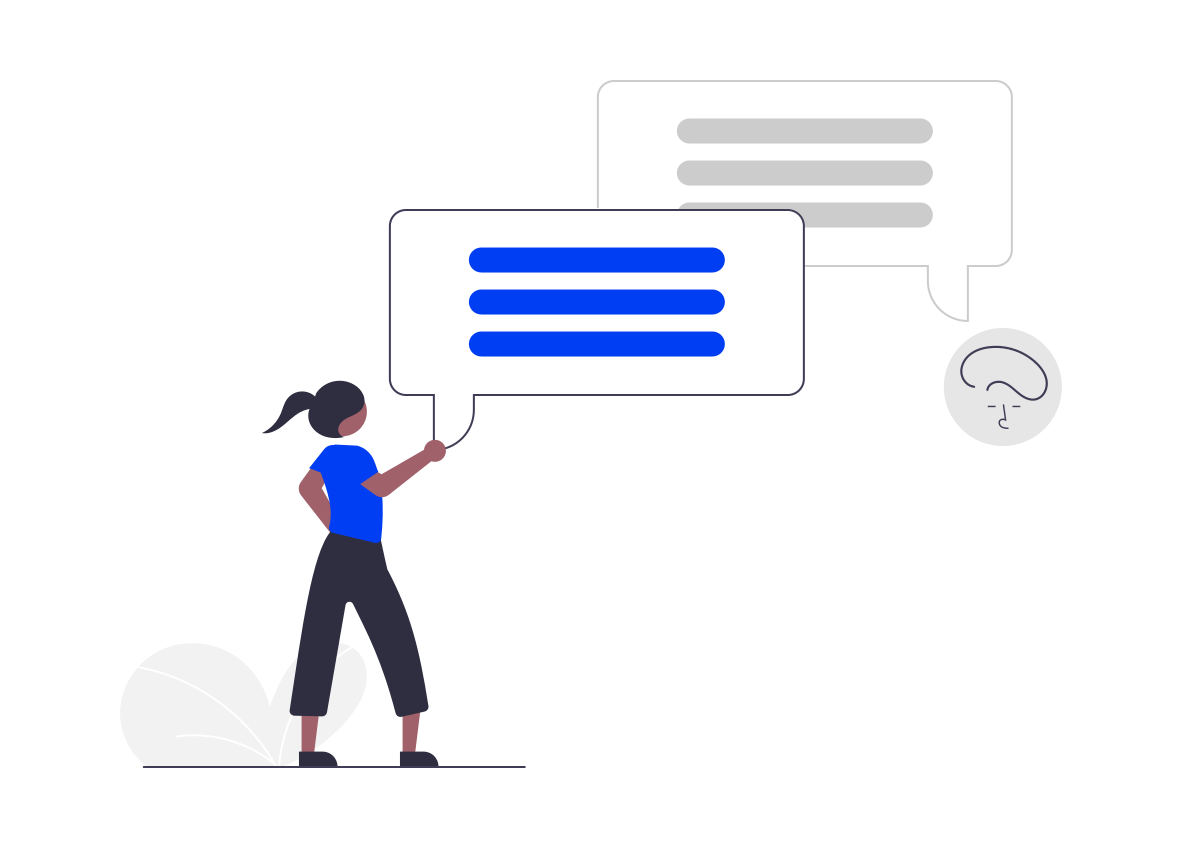
3. The Role of Natural Language Processing in AI Chatbots
Natural Language Processing (NLP) plays a critical role in enabling effective communication and understanding between AI chatbots and humans. NLP is a subfield of artificial intelligence that deals with the interaction between computers and humans in natural language.
It enables AI chatbots to understand, interpret, and generate human language, facilitating effective communication and collaboration. In the pharmaceutical industry, NLP is used to develop AI chatbots that can understand and respond to complex medical queries, provide personalized patient support, and facilitate knowledge sharing and collaboration among healthcare professionals.
By leveraging NLP, AI chatbots can analyze large amounts of clinical data, identify patterns, and provide insights that can inform decision-making and improve patient outcomes.

4. Challenges and considerations
Implementing AI chatbots for internal knowledge management presents challenges and considerations. Addressing them is critical to ensuring successful deployment and long-term effectiveness.
4.1 Balancing automation with human support
While chatbots can handle tasks efficiently, some queries may require human intervention, especially for complex or critical decisions. Establishing a seamless handoff process between the chatbots and human experts is essential to maintaining user satisfaction.
4.2 Training for accuracy
AI models need to be trained in industry-specific language, such as medical terminology, regulatory requirements, and product details. Without proper training, the chatbot may provide inaccurate or incomplete responses. Ongoing updates and supervised learning are necessary to maintain relevance and precision.
4.3 Integration with existing systems
Pharma companies rely on a variety of tools and platforms, such as CRM systems, clinical trial databases, and ERP software. Seamlessly integrating chatbots with these systems can be complex and time-intensive, requiring careful planning and technical expertise.
4.4 Data privacy and security
Pharma companies handle sensitive data, including proprietary research, patient information, and regulatory documents. Ensuring that AI chatbots comply with data protection laws like GDPR, HIPAA, or other regional regulations is crucial. Strong encryption, access controls, and compliance monitoring are essential to safeguard sensitive information.
4.5 Complexity of queries
Pharma employees often require nuanced and detailed answers to their questions. Chatbots must be equipped with advanced natural language processing (NLP) capabilities to handle complex queries and provide relevant, contextual responses.
4.6 Cost of implementation
The initial investment in developing and deploying AI chatbots, including software development, integration, and training, can be significant. Pharma companies need to evaluate he potential ROI to justify the costs.
4.7 Data quality and bias
AI algorithms can inherit biases present in the training data, potentially leading to unfair and discriminatory outcomes. The accuracy and reliability of AI powered insights heavily depend on the quality, completeness, and accuracy of the underlying data.
4.8 Regulatory and legal considerations
The use of AI in healthcare is subject to regulatory oversight. Determining liability in cases where AI technology can make errors or cause harm is a complex legal issue that needs careful consideration.
4.9 Explainability and transparency
Many AI algorithms are complex and difficult to understand, making it challenging to explain how the model arrived at a particular decision. This lack of transparency can hinder trust and make it difficult to identify and address potential biases.

5. Recommendations for pharma companies
We’ve put together a short list of recommendations to help pharmaceutical companies leverage AI to improve efficiency, accelerate drug discovery, enhance patient care, and gain a competitive edge in the ever-evolving pharma industry.
- Prioritize data quality — invest in data cleaning, integration, and enrichment initiatives to ensure the accuracy and completeness of data used to train and operate AI chatbots.
- Focus on explainability and transparency — use AI models that can explain their reasoning and decisions, building trust with researchers, clinicians, and regulators.
- Address ethical considerations — implement safeguards to mitigate bias, ensure data privacy, and address potential impacts on jobs and patient care.
- Invest in employee training — provide comprehensive training programs to equip employees with the skills and knowledge to use and interact with the AI chatbots effectively.
- Foster a culture of innovation — encourage experimentation and exploration of new AI applications within the organization, fostering a culture of continuous learning and adaptation.
- Collaborate with experts — partner with AI specialists, data scientists, and ethicists to develop and implement robust and responsible AI solutions.
- Continuously monitor and improve — regularly evaluate the performance of AI chatbots, gather user feedback, and make necessary adjustments to optimize their effectiveness and address any emerging issues.

6. Embracing AI for a smarter knowledge ecosystem
The pharma industry thrives on innovation and collaboration, and AI tools like pharma chatbots are at the forefront of this transformation.
AI chatbots create a smarter, more connected knowledge system by streamlining access to critical information, helping with regulatory compliance, and enhancing cross-departmental communication.
They empower teams to focus on high-value activities by automating routine tasks and providing actionable insights in real-time.
Artificial intelligence is driving efficiency and innovation across the organization, whether it’s aiding sales teams with product details, supporting medical departments with clinical trial data, or assisting leadership in strategic decision-making.
As the pharma landscape continues to evolve, embracing AI technology is no longer optional — it’s essential. By integrating AI into knowledge management processes, pharmaceutical companies can foster a culture of agility, collaboration, and informed decision-making, securing their position as leaders in a competitive and fast-paced industry.
